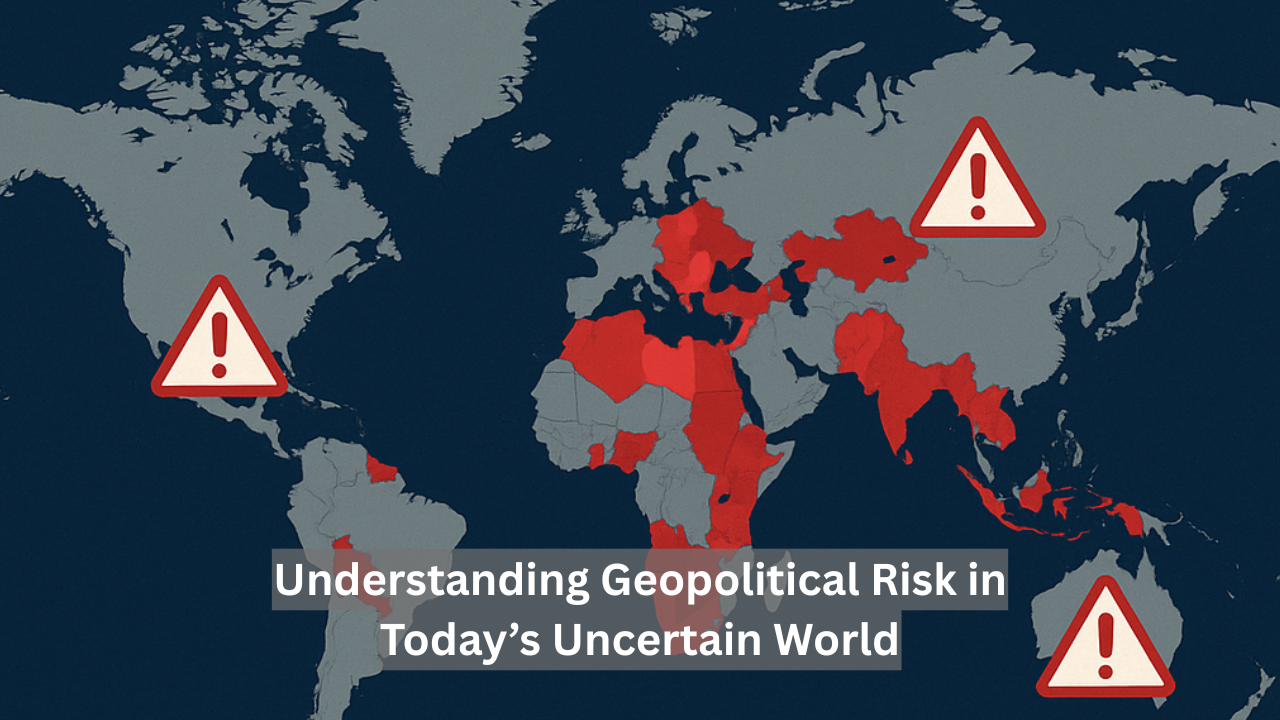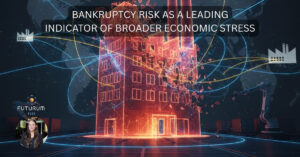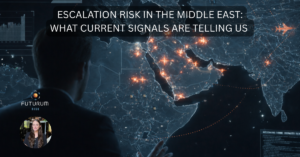Global Fault Lines: Understanding Geopolitical Risk in Today’s Uncertain World
We live in an era where uncertainty has become a constant global force shaping our realities. The rapid, unpredictable shifts in geopolitics affect every corner of the world, whether through armed conflict, political upheaval, sanctions, or cyber warfare. These events ripple far beyond war zones, impacting business operations, supply chains, investments, personal safety, and freedom of movement.
What once felt like isolated incidents now weave a complex web of risk. Companies launching projects abroad face sudden legal blackouts. Individuals travelling may confront abrupt border closures or surveillance. Families relocating internationally navigate shifting migration policies and economic collapse. This is the fabric of geopolitical risk, a dynamic, interconnected landscape of threats and uncertainty.
To navigate this complexity, we must look beyond headlines. We must analyse what’s happening on the ground, understand the multiple layers of risk, and anticipate how these shifts will influence people, commerce, and governments alike.
Below, we explore seven countries at the forefront of geopolitical uncertainty today. For each, we unpack:
- The latest on-the-ground realities
- Why do these developments constitute significant geopolitical risk
- Detailed breakdowns of the risks facing businesses and individuals
Finally, we show how Futurum Risk and our OSINT-driven expertise, led by our experienced analysts, help you decode, anticipate, and respond to these threats.
So What Exactly is Geopolitical Risk?
Geopolitical risk arises from changes or shocks in political stability, military conflict, social unrest, government policy, sanctions regimes, or cross-border relations. Unlike traditional market risks, geopolitical risks are often sudden and volatile, with profound ripple effects.
Key impacts include:
- Operational disruptions like logistics interruptions, supply chain breakdowns, and infrastructure sabotage can severely hinder business continuity and cause costly delays.
- Legal and compliance risks arise from sanctions violations, challenges in partner vetting, and ongoing regulatory uncertainty that complicate international operations.
- Security risks, including kidnappings, targeted violence, cyberattacks, and espionage, threaten personnel safety and the integrity of business information.
- Reputational risks stem from associations with sanctioned actors, involvement in human rights violations, or operating within conflict zones, all of which damage brand trust.
- Personal risks such as travel bans, visa denials, surveillance, or direct threats to personal safety impact individuals’ freedom of movement and well-being.
Meet Cara Rau – Futurum Risk’s OSINT Specialist
Cara’s expertise in open-source intelligence (OSINT) and her deep experience in conflict zones across Africa make her uniquely qualified to provide real-time geopolitical insight. She analyses encrypted communications, extremist propaganda, social media trends, and government actions to detect early warning signals.
Her fluency in Afrikaans, French, Russian, and Levantine Arabic lets her monitor multiple information streams firsthand, cutting through misinformation and capturing subtle shifts. This OSINT edge means our clients receive timely, contextualised intelligence that translates complexity into clear decision points.
“We live in a highly digital age, which means that although we have the world at our fingertips, a whole new set of risks also presents itself. OSINT can help us navigate what may seem like an endless barrage of content by turning open-source information into real-world intelligence through effective analysis. This is a highly specialised skill which my colleagues and I at Futurum Risk have spent years honing so that we can help our clients to see through the haze and make clear decisions in a timely manner. “ – Cara Rau
Geopolitical Analysis of Seven Major Risk Zones Around the World
Sudan – Civil War, Famine, and Institutional Breakdown
Sudan’s fragile peace was shattered in 2023 when the Rapid Support Forces clashed violently with the Sudanese Armed Forces. Fighting has devastated urban areas, with hospitals and humanitarian convoys targeted. Around 20 million people face acute food insecurity amid widespread famine in Darfur, Khartoum, and the eastern states. Cholera outbreaks exacerbate the health crisis. Over 13 million people have been displaced internally and into neighbouring countries. Peace talks have repeatedly failed, leaving the country in turmoil.
Why This is a Geopolitical Risk
Sudan’s instability destabilises the wider Horn of Africa region, threatens refugee flows, and risks becoming a haven for extremist groups such as ISIS affiliates.
How It Affects Businesses & Individuals
- Damage to transport infrastructure and fuel shortages severely restrict business operations, causing operational disruptions that lead to costly delays and increased expenses for logistics and manufacturing.
- The closure of key ports and roads delays imports and exports, resulting in supply chain breakdowns that strain regional logistics networks and increase costs for importers and exporters.
- Businesses face increased legal and compliance risks when inadvertently engaging with sanctioned militias or actors involved in illicit war economies, exposing them to sanctions, penalties and reputational damage.
- Kidnappings, armed robberies, and violence against foreign nationals are common security threats, with humanitarian workers frequently targeted in conflict zones, raising insurance and operational costs.
- Association with conflicted areas or diverted aid can harm brand reputation, creating reputational risks that undermine investor confidence and limit access to international capital.
- Widespread famine, disease outbreaks such as cholera, and ongoing violence compromise personal safety, putting travellers, expatriates, and local residents at serious risk, complicating staff deployment and travel plans.
- Hyperinflation and banking collapse generate financial and currency risks that create uncertainty around asset protection, payment processing, and capital repatriation.
“On 17 June 2025, the United Nations Human Rights Office of the High Commissioner (OHCHR) reported that a recent fact-finding mission by them in Sudan documented increased use of heavy weaponry in populated areas and a sharp rise in sexual and gender-based violence. They further said that humanitarian relief is being weaponised and hospitals and medical facilities are under siege. On 25 April 2025, UN Women reported that “Sudan’s civil war is now the world’s worst humanitarian crisis for women and girls. They make up more than half of the 12 million people displaced, and many are being deliberately targeted with sexual violence.” The crisis in Sudan has received little attention on social media. In our work at Futurum Risk, we delve deep into issues others may not consider, and always strive to provide balanced and unbiased reporting to all our clients. “ – Cara Rau
Myanmar – Military Coup, Fragmented Insurgency, and Economic Paralysis
Since the February 2021 coup, Myanmar has been engulfed in armed resistance by ethnic militias and newly formed People’s Defence Forces. The military junta has responded with brutal crackdowns, internet blackouts, and mass arrests. Infrastructure, including roads, power grids, and healthcare systems, is collapsing. Large regions remain outside government control, leading to continued displacement and human rights abuses.
Why This is a Geopolitical Risk
Myanmar’s failure threatens regional security, fuels narcotics and human trafficking networks, and complicates ASEAN political unity. Sanctions and isolation deepen economic paralysis.
How It Affects Businesses & Individuals
- Myanmar is rich in natural resources such as minerals, timber, and gemstones, offering significant investment opportunities; however, ongoing conflict and political instability expose investors to resource nationalisation, theft, and disrupted extraction operations.
- Frequent blackouts and fuel shortages cause operational disruptions by halting manufacturing and transport, severely complicating supply chain reliability and increasing costs.
- Legal and sanctions risks grow as business dealings with junta-linked firms increase the chance of sanctions violations, adding layers of compliance complexity and potential
international penalties. - Security threats escalate when kidnappings, extortion, and violence against foreigners and locals become widespread across conflict zones, increasing risks to personnel safety and insurance premiums.
- Reputational risk mounts as companies connected to junta-linked actors face international condemnation, investor withdrawal, and consumer boycotts.
- Supply chain risk emerges as interrupted exports and shortages of raw materials cause significant delays in production schedules, threatening contract fulfilments.
- Personal safety concerns rise sharply due to travel restrictions, targeted violence, and surveillance that increase risks for both expatriates and locals, complicating staff deployments.
- Financial instability worsens because hyperinflation and stringent banking controls severely limit financial transactions, capital movement, and currency conversion.
Armenia & Nagorno-Karabakh – Post-War Fragility and Ethnic Tensions
Following Azerbaijan’s military advances in 2023, over 100,000 ethnic Armenians were displaced from Nagorno-Karabakh. A fragile ceasefire remains in place, but ethnic tensions and military buildups persist.
Why This is a Geopolitical Risk
The Caucasus region is a strategic crossroads where competing powers vie for influence. Renewed conflict threatens critical energy pipelines and trade corridors, risking wider regional destabilisation.
How It Affects Businesses & Individuals
- Frequent border closures and military checkpoints create major operational disruptions by delaying trade and travel, pushing costs higher and causing contractual uncertainties.
- Rising ethnic violence poses serious security threats, putting minorities, NGOs, and aid workers directly in harm’s way, leading to increased insurance costs and operational constraints.
- Navigating embargoes and complex territorial disputes exposes businesses to legal and sanctions risks that can have severe consequences, including asset freezes and penalties.
- Operating in contested zones risks reputational damage as associations with disputed authorities can alienate partners, investors, and customers in sensitive markets.
- Interruptions to regional energy exports cause supply chain risks, driving volatility and unpredictable price spikes that impact manufacturing and logistics.
- For anyone living or travelling in conflict-affected areas, personal safety concerns are significant due to heightened threats and instability, requiring enhanced security protocols.
“I had the opportunity to visit Stepanakert and the surrounding area in 2018. My Russian language skills proved invaluable during this trip, and my wonderful visit to Armenia and Nagorno-Karabakh will remain in my memory forever. I remember speaking to many locals during my visit, and I had lots of enlightening conversations about the region’s history. Learning about different parts of the world through our work at Futurum is one of the many things I love about my job! Peace seems to be looming over the beautiful region of Nagorno-Karabakh, with Armenia and Azerbaijan completing peace talks in March of this year aimed at ending the conflict. ” -Cara Rau
Venezuela – Economic Meltdown Amid Authoritarian Control
Venezuela’s economy continues its downward spiral, with hyperinflation (~450%), regular power outages, and shortages of food and medicine. Sanctions by the US and EU, alongside political deadlock under Maduro, have exacerbated the crisis.
Why This is a Geopolitical Risk
The humanitarian crisis and sanctions have regional spillovers, causing migration and destabilising neighbouring states. Illegal economies flourish, undermining governance and security.
How It Affects Businesses & Individuals
- Frequent blackouts and fuel shortages cripple business functions and disrupt daily life, causing significant operational challenges and increased costs.
- Engagements with entities closely tied to the Maduro regime carry legal and sanctions risks, increasing the chance of sanctions violations and potential legal penalties abroad.
- Elevated crime rates, including kidnappings and violent offences, create severe security threats for everyone on the ground, requiring heightened security measures.
- Associations with sanctioned entities damage investor relations and create serious reputational risks, limiting access to international financing.
- Severe supply chain disruptions increase costs and cause delays in essential imports and exports, affecting the availability of goods and production.
- Travel restrictions, ongoing civil unrest, and limited healthcare services heighten personal safety risks for residents and visitors alike.
- Currency devaluation and asset freezes contribute to financial instability, disrupting routine financial activities and complicating business transactions.
Israel & Iran – Proxy Conflicts & Cyber Warfare Escalation
Tensions between Israel and Iran have intensified with cyberattacks targeting Iranian crypto exchanges, resulting in losses exceeding $90 million. Proxy conflicts rage in Syria, Lebanon, and Gaza, marked by drone strikes and covert operations. Cyber warfare increasingly targets financial, energy, and defence sectors.
Why This is a Geopolitical Risk
Instability threatens energy markets and critical infrastructure globally. Cyberattacks complicate international business, and regional conflict risks escalation.
How It Affects Businesses & Individuals
- Ransomware attacks, espionage, and denial-of-service incidents jeopardise critical infrastructure and sensitive data, posing serious cybersecurity threats and potential financial losses.
- Secondary sanctions create legal and trade risks, potentially causing disruptions and asset freezes that complicate business dealings and partner relationships.
- Flight cancellations, volatile energy supplies, and logistical delays generate operational disruptions that hamper smooth business functioning.
- Travel warnings, increased surveillance, and risks of collateral damage heighten security threats for both travelers and local residents.
- Political affiliations can harm reputations, alienating customers and investors, which raises significant reputational risks in sensitive sectors.
- Dual nationals and travelers in conflict zones face elevated personal safety risks due to unstable conditions and targeted threats, requiring careful risk assessments.
Coastal West Africa – Sahel Spillover and Islamist Insurgency
Islamist militant groups linked to ISIS and Al-Qaeda have expanded south from the Sahel into countries like Benin and Côte d’Ivoire. In January 2025, 28 Beninese soldiers were killed in a jihadist ambush, signalling a dangerous spread of insurgency into previously stable coastal regions.
Why This is a Geopolitical Risk
Militant activity threatens shipping lanes, resource exports, and regional stability. With reduced French military presence, local forces struggle to maintain control.
How It Affects Businesses & Individuals
- High risk of kidnappings, extortion, and attacks on infrastructure creates serious security threats, impacting foreign personnel and local populations alike.
- Port insecurity and supply chain interruptions cause operational disruptions that increase costs, delay shipments, and reduce trade reliability.
- Enhanced scrutiny and stricter compliance requirements create heightened legal risks for businesses operating in or near conflict zones, increasing due diligence burdens.
- Associations with conflict areas can damage brand reputation and investor relations, leading to reputational risks and potential divestment.
- Elevated kidnapping risks for expatriates, aid workers, and locals seriously threaten personal safety and necessitate enhanced security protocols.
“Terrorism and political violence in coastal West Africa is one of the most underreported issues in the media, despite continued attacks on armed forces and civilians alike. As recently as 14 June, al-Qaeda’s branch in West Africa, Jama’at Nusrat al-Islam wal-Muslimin (JNIM), claimed credit through their official propaganda arm, Az-Zallaqa Media, for an attack on a Beninese army post in Basso, Borgou Department, near the Nigerian border. Although the group did not claim to have killed any soldiers, they did release an image of seized equipment and weaponry, highlighting both their continued targeting of army infrastructure as well as their ability to effectively gain supplies that can be used in future attacks.” – Cara Rau
Ukraine & Eastern Europe – War, Sanctions & Hybrid Threats
The war between Ukraine and Russia continues with extensive infrastructure destruction and cyberattacks. Grain export disruptions threaten global food security, and refugees place strain on neighbouring countries.
Why This is a Geopolitical Risk
Hybrid warfare tactics complicate traditional security paradigms, affecting trade, energy, and migration in Europe and beyond.
How It Affects Businesses & Individuals
- Trade embargoes and energy price volatility create operational disruptions that force companies to adjust their supply chains, increasing costs and causing delays.
- Targeted cyberattacks on corporate networks increase cybersecurity threats and raise operational risks, requiring advanced cyber defences.
- Navigating sanctions and complex compliance frameworks introduces significant legal risks that require heightened diligence and risk management.
- Associations with conflict zones expose companies to reputational risks that can damage market standing and investor confidence, impacting partnerships.
- Refugee displacement, misinformation campaigns, and visa restrictions compromise personal safety by impacting movement and security, complicating workforce management.
Where Futurum Risk Comes In
The geopolitical challenges detailed above demonstrate that risk is multifaceted and fast-moving. Futurum Risk harnesses OSINT expertise, regional knowledge, and strategic insight to help clients navigate this complexity:
Comprehensive Geopolitical Analysis and Risk Assessment:
Futurum Risk delivers deep-dive geopolitical analysis focused on emerging crises, political instability, and conflict dynamics in regions of interest. This allows businesses, investors, and individuals to assess whether it is prudent to engage or invest in specific countries. By interpreting complex political and security trends, we identify risks such as regime changes, sanctions, or conflict escalation that could disrupt investments or operations, enabling clients to make informed, strategic decisions.
Due Diligence on Supply Chains and Investment Partners:
Leveraging open-source intelligence and regional expertise, Futurum Risk conducts rigorous due diligence on supply chain actors and potential investment partners. This process helps detect links to illicit activities, sanctioned entities, or conflict economies that pose legal, financial, or reputational risks. Our insights empower clients to mitigate exposure and comply with international regulations, safeguarding their operations from hidden vulnerabilities.
Early Warning and Strategic Advisory:
Through continuous monitoring and scenario planning, Futurum Risk offers early warning of geopolitical shifts and potential disruptions. Our tailored intelligence briefings help clients anticipate crises such as trade embargoes, civil unrest, or border closures, which can affect supply routes and business continuity. This proactive approach enables organisations to implement contingency plans, secure assets, and protect personnel before risks materialise.
Operational Risk Mitigation and Contingency Planning:
We advise clients on operational security measures, including travel risk management, evacuation planning, and enhancing supply chain resilience in volatile regions. For businesses with personnel or assets in high-risk areas, our guidance reduces vulnerability to sudden disruptions, ensuring safety and continuity even during crises.
Compliance, Sanctions Screening and Regulatory Advisory:
Navigating the complex landscape of international sanctions, export controls, and ESG obligations requires meticulous compliance. Futurum Risk performs exhaustive partner vetting and sanctions screening to prevent inadvertent dealings with restricted or unethical actors. This protects clients from legal penalties, financial losses, and damage to corporate reputation.
Our extensive experience across Africa, the Middle East, Europe and Asia ensures we deliver nuanced, timely, and actionable intelligence tailored to your unique risk profile.
Turning Uncertainty into Strategic Advantage
Geopolitical risks are complex and ever-shifting, impacting not just investors but all businesses and individuals connected to volatile regions. Recognising these risks early and understanding their full spectrum, security, legal, operational, financial, and reputational, is essential.
Futurum Risk empowers you to see clearly through the fog of geopolitical uncertainty. Our expertise turns complexity into clarity, helping you protect assets, safeguard personnel, and make confident decisions even in turbulent times.





